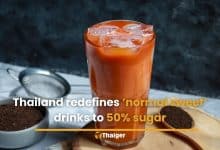Thailand’s sugar intake quadruples WHO daily limit

Thailand’s sugar consumption soared to a worrying level, with Thai citizens consuming on average 23 teaspoons of sugar per day, almost quadruple the daily limit recommended by the World Health Organization (WHO). The information was revealed by the Thai Health Promotion Foundation (ThaiHealth), which pointed out that this sugar intake greatly exceeds WHO’s guideline of six teaspoons per day.
Pairoj Saonuam, the Assistant Chief Executive Officer at ThaiHealth, highlighted the health risks associated with such high consumption on Sunday. He identified heart attacks, strokes, cancers and diabetes as the major health hazards linked to excessive sugar intake among the Thai population.
He pinpointed sugary drinks as the main source of sugar in the Thai diet and urged manufacturers to cut down on the sugar content in their beverages. In a joint effort to combat the issue, ThaiHealth has collaborated with various organisations such as the Excise Department, Ministry of Finance and Ministry of Public Health. They have imposed a sugar tax under the Excise Act 2017, targeting drinks with high sugar content.
This taxation strategy seems to be delivering promising results. Pairoj noted a 35% surge in sales of beverages with lower sugar content and a significant decrease in overall sugar consumption to 23 teaspoons per day, reported Bangkok Post.
Further proof of the success of this initiative can be found in the data from the Office of the Cane and Sugar Board. According to their records, sugar consumption has seen a marked drop, from 27 teaspoons per day in 2017 to 23 teaspoons per person per day in 2021.
The revised tax structure on beverages, implemented in 2017, categorises drinks based on their sugar content per 100 millilitres. Drinks containing less than six grammes of sugar are exempt from taxation. However, beverages with sugar content ranging from 6-8 grammes are taxed at 30 satangs per litre, from 8-10 grammes at 1 baht, 10-14g at 3 baht, and 14-18 grammes and above at 5 baht per litre. This strategic taxing system encourages manufacturers to reduce the sugar content in their drinks and consumers to opt for healthier alternatives.
In related news, the Deputy Prime Minister and Minister of Commerce defended the recent sugar price hike after discussions with stakeholders, emphasising the decision was based on cost considerations.
Latest Thailand News
Follow The Thaiger on Google News:


























